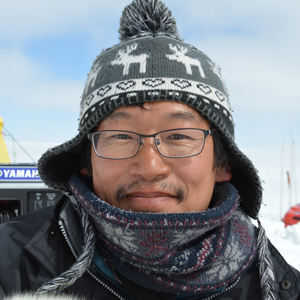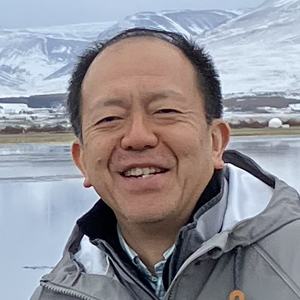Press release with author’s message
— From ArCS II News Letter No.7 —
In ArCS II Newsletter No.7, the authors of articles published in 2022 winter and 2023 spring contributed their research, thoughts on their research, and future prospects.
*Affiliations are at the time of the newsletter publication.
A Warmer Arctic Ocean Leads to More Moisture Transport Further South

Tomonori Sato
(Faculty of Environmental Earth Science, Hokkaido University)
We developed a water vapor tracking model to understand the behavior of atmospheric water vapor evaporated from the Arctic Ocean where recent sea ice reduction is significant. Based on the analysis of daily moisture transport fields over the past 40 years, we found that in autumn and winter the amount of water vapor transported toward Siberia has been increasing in recent years as a result of increased evaporation from the sea and atmospheric circulation changes. This finding will enrich our understanding of the climate change mechanism and future climate projections related to Arctic warming.
| Title | Enhanced Arctic moisture transport toward Siberia in autumn revealed by tagged moisture transport model experiment |
| Journal | npj Climate and Atmospheric Science |
| Published | November 24, 2022 |
| Authors | Tomonori Sato, Tetsu Nakamura, Yoshihiro Iijima, Tetsuya Hiyama |
| DOI | https://doi.org/10.1038/s41612-022-00310-1 |
Press Release
Detection of Increase in Summer Aerosol from Phytoplankton Growth by Greenland Ice-core Analysis

Sumito Matoba
(Institute of Low Temperature Science, Hokkaido University)
We revealed that the concentration of sulfur compounds released by phytoplankton in the ocean in summer has increased 3-6 times since 2002 from the analysis of an ice core collected at SE-Dome with the highest precipitation in the southeast of the Greenland Ice Sheet and concluded that this increase was due to earlier melting of sea ice on the east coast of Greenland. This is the first observational evidence of an actual increase in the emission of sulfur compounds from the ocean to the atmosphere due to ocean plankton growth in summer.
| Title | Increased oceanic dimethyl sulfide emissions in areas of sea ice retreat inferred from a Greenland ice core |
| Journal | Communications Earth & Environment |
| Published | December 26, 2022 |
| Authors | Yutaka Kurosaki, Sumito Matoba, Yoshinori Iizuka, Koji Fujita, Rigen Shimada |
| DOI | https://doi.org/10.1038/s43247-022-00661-w |
Press Release
High Prevalence of Parasitic Chytrids Infection of Glacier Algae

Kino Kobayashi
(Graduate School of Science and Engineering, Chiba University)
The darkening of the glacier surface has accelerated the melting rate of the ice surfaces. One of the reasons for the darkening is the blooming of glacier algae. Chytrid fungi parasitizes these algae and has the potential to suppress the darkening. This study revealed that a significant number of glacier algal cells were parasitized by chytrids, and we were able to obtain results that will be the first step in clarifying the actual situation of glacier chytrids. Further studies are necessary to quantitatively evaluate their role in glacier melting.
| Title | High prevalence of parasitic chytrids infection of glacier algae in cryoconite holes in Alaska |
| Journal | Scientific Reports |
| Published | March 9, 2023 |
| Authors | Kino Kobayashi, Nozomu Takeuchi, Maiko Kagami |
| DOI | https://doi.org/10.1038/s41598-023-30721-w |
Press Release(only in Japanese)
After Russia’s Invasion of Ukraine, Can We Still Cooperate with Russia in the Arctic?

Akiho Shibata
(Polar Cooperation Research Centre, Kobe University)
The Russian invasion of Ukraine has already been going on for more than a year with no end in sight. This co-authored paper in Polar Record examines whether and under what conditions intergovernmental cooperation with Russia in the Arctic region has continued within different international legal regimes, and summarizes the future prospects. In May 2023, the chairship of the Arctic Council was handed over from Russia to Norway, but Arctic international cooperation including Russia is still uncertain, requiring further research.
| Title | After Russia’s invasion of Ukraine in 2022: Can we still cooperate with Russia in the Arctic? |
| Journal | Polar Record |
| Published | March 17, 2023 |
| Authors | Timo Koivurova, Akiho Shibata |
| DOI | https://doi.org/10.1017/S0032247423000049 |
Press Release(only in Japanese)
